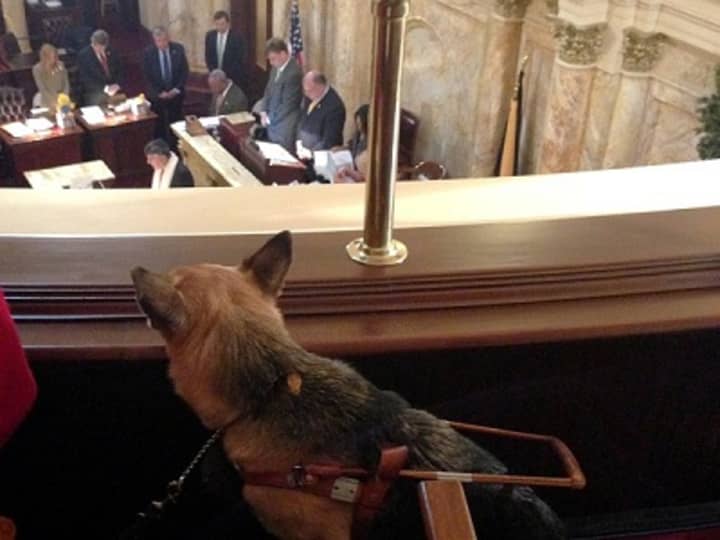Jim Kutsch, president and CEO of the Seeing Eye, and his wife, Ginger, at Senate vote with Jim’s dog, Colby(CVP PHOTOS)
Police cannot investigate such instances as a criminal act but, instead, must refer them to animal control agencies who sometimes cannot respond immediately on nights or weekends.
Police response is critical, proponents say, because of the imminent danger to a blind person whose dog is incapacitated or killed.
Dusty’s Law makes it a criminal matter requiring police response. It governs any animal that attacks, injures or interferes with any kind of service dog, including during training. And it includes attacks on any dog, horse or other animal owned or used by a law enforcement agency, including search-and-rescue dogs.
It also increases penalties for the attacking pets’ owners — up to $500 — and allows for restitution to the affected handler and dog.
The measure goes to the Assembly Law & Public Safety Committee, where proponents hope it will be heard in mid-January.
It then must be placed on the agenda for a vote by the full Assembly, after which it would go to Gov. Christie’s desk.
Supporters hope he’ll sign it into law by the end of January.
The bill was drafted by state Assemblyman Bob Schroeder of Woodcliff Lake and sponsored in the other chamber by state Sens. Anthony Bucco and Jeff Van Drew.
Schroeder called it “the first piece of legislation that affords this type of protection to service animals who provide assistance, as well as to those who are in training as well.”
The measure “will send a message that people are responsible not only for their own actions, but those of the animals they own,” he added.
The measure’s namesake: Dusty
It’s named for Dusty, a German Shepherd puppy being trained as a guide dog who was mauled by a pitbull in Woodcliff Lake, requiring nearly 100 stitches, in July 2010.
Dusty, who was nine months old at the time, lost four teeth and suffered emotional trauma that kept him from continuing his work with The Seeing Eye program.
“Seeing eye dogs are especially vulnerable to injury during an attack because they’ve been bred and trained to be non-aggressive,” Jim Kutsch, president and CEO of The Seeing Eye, the world’s oldest guide-dog school.
They also “are unlikely to leave their masters’ sides, even to save themselves,” said Kutsch who attended today’s 38-0 vote in Trenton with his wife, Ginger, and her guide dog, Pixie (top photo).
The Seeing Eye, a non-profit philanthropy, serves blind and visually-impaired people throughout North America.
The Kutsches and several other advocates have attended all the committee meetings, hearings and votes leading up to the bill’s passage.
The group has included Dusty’s trainer, Roger Woodhour, who testified several times and today brought along Lennon, the 28th puppy he has raised for The Seeing Eye.
Also attending today were Dave Johnson, director of Training & Instruction at The Seeing Eye; Sue Tillet, a guide-dog user who was also the victim of an attack several years ago, and her seeing-eye dog, Roz; and Audrey Kane, a guide dog puppy raiser and advocate.
Woodhour, who lives in Woodcliff Lake with his wife and has volunteered for Seeing Eye for more than 20 years, noted that nearly half of all guide dogs are attacked at some time by other animals, ordinarily within a half-hour walk from home.
Click here to follow Daily Voice Pascack Valley and receive free news updates.




